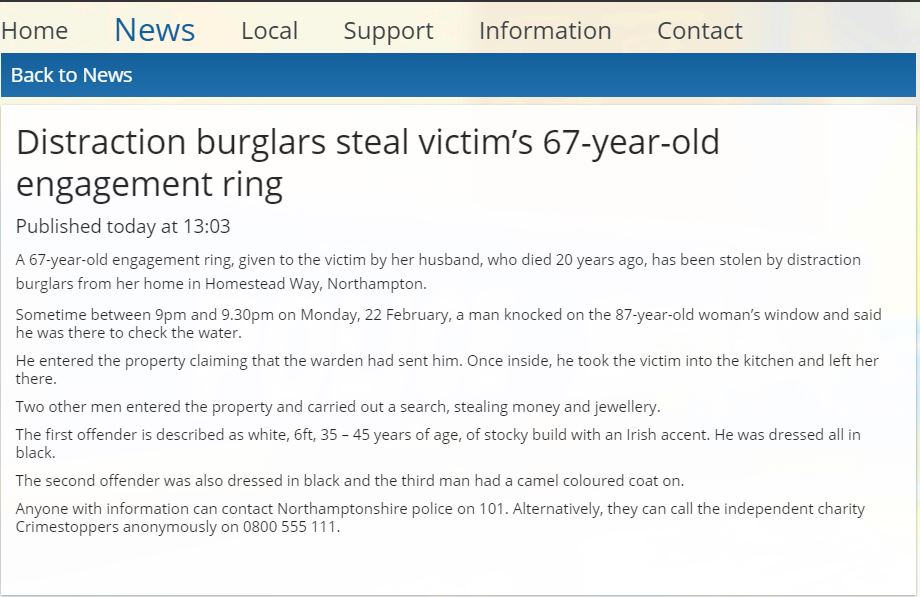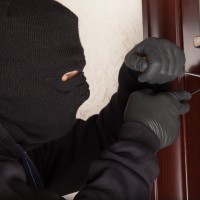Burglary
- Lock your doors and windows every time you leave the house, even when you’re just out in the garden, remembering to double-lock UPVC doors (lift handle and turn key)
- Hide all keys, including car keys, out of sight and away from the letterbox (remember a device could be used to hook keys through the letterbox)
- Install a visual burglar alarm
- Install good outside lighting
- Get a trusted neighbour to keep an eye on your property
- Leave radios or lights in your house on a timer to make the property appear occupied
- Make sure the fences around your garden are in good condition
- Secure bikes at home by locking them to an immoveable object inside a locked shed or garage
- Keep ladders and tools stored away; don’t leave them outside where they could be used to break into your home
- Ensure side gates are locked to prevent access to the rear of the property
- Ensure rear fencing is in good repair
- Improve natural surveillance at the front of your property i.e. trim high hedges
- Mark your property with postcode and house number and register your property for free with Immobilise
- Consider joining or forming a Neighbourhood Watch scheme
- Remove valuables from view of ground floor windows
- Store any high value items (i.e. jewellery, passports) in a properly secured safe or bank vault
Doors and windows
In most burglaries, the criminals broke into the house or flat through the door, either by forcing the lock or kicking it in, so make sure your doors are strong and secure.
Consider fitting a bar for extra strength; a locksmith can advise you on how best to do it.
Glass panels on doors are particularly vulnerable. If you have one on your door you could replace it with laminated glass, which is stronger.
You can also buy a film in a DIY store that you can stick over the glass to make it harder to break.
Home security and DIY shops sell inexpensive, key-operated locks to fit most kinds of windows.
Fit window locks with keys to all downstairs windows and those upstairs that are easy to reach.
Distraction burglary
If you’re not sure who is at your door, don’t open it. Check the identity of the caller by calling the company they are claiming to be from i.e. gas, electricity, water and police.
Use the telephone numbers listed in your local directory or provided independently by your service provider – Do not use any telephone numbers provided by the caller – they may be bogus.
The ‘Waterboard’ no longer exists, it is an obsolete phrase used only by bogus callers.
Don’t let this happen to you

Going away on holiday
Make your home look like someone is living in it:
- Use automatic timer-switches to turn your lights and radios on when it goes dark
- Cancel any newspaper or milk deliveries
- Use the Royal Mail’s ‘keepsafe’ service – they keep your mail for up to 2 months while you’re away. Mail sitting on your doorstep is a sign that you are away
- Trusted neighbours may be able to help you by collecting your post, opening and closing curtains and they could park their car on your driveway
- Avoid discussing holiday plans on public social networking sites – burglars can use any information you post on there to their advantage
Police.UK – Crime Prevention Advice
Emergency Calls – When to call 999
999 should only be used in an emergency. An emergency is when someone is at risk of getting injured, bring threatened or a crime or is being committed and is in progress.
The police should only be called on 999 when:
- There is a danger to life or a risk of injury being caused imminently. Examples include serious road accidents, assaults or serious disorders.
- A crime is in progress. Examples include assault, burglary, and theft or if an offender is still on scene, or has just left the scene.
- Police attendance is required immediately such as to prevent a breach of peace, someone acting suspiciously or someone who is about to commit an offence.
Do not call 999 for calls, which are not an emergency. It will tie up an operator and delay a police response to someone who may actually require the police, but is unable to get through.
Non-emergency calls – When to call the 101 number
The non-emergency is 101. An operator is available 24 hours a day, 7 days a week to deal with your enquiry.
This number should be used for all other enquires, advice on police matters and to report crimes which have already happened, where there is no sign of an offender.

